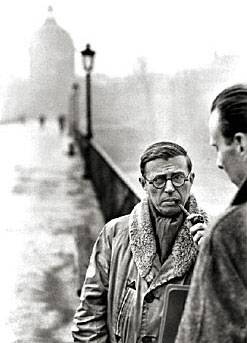Performers & Cheaters

[Jean-Paul Sartre looking cheeky]
I've been reading Lorrie Moore's short stories on a blanket in the sun, which is a surefire recipe for ambivalence. One moment you're laughing bitterly at life's unthinking cruelties; the next the warmth has flooded your body as fully as reality programming's saturated television, leaving you with that slow-brain phenomenon ordinarily reserved for the end of a good party. But the two best stories in Self-Help, "How to be an Other Woman" and "What is Seized" got me thinking about performers, today's subject.
Both stories involve relationships between women and cold men, men who withhold love as though it were a savings bond to be offered some day in the future, with interest. And both, since Moore is a true tour de force of witticisms, are comical performers. It made me think, as a good book can, about character. It made me think, as is my sole capacity, about myself. Often talented performers are people who desire the approval of strangers. They are driven by some feeling of inadequacy or withheld affection, and seek to pave over this lack with generous applause. It is as though in those moments on stage, you are not yourself. You are who you always wanted to be.
The former story revolves around the protagonist's affair with a married man. I imagine too that cheating on someone is related to seeking the approval of strangers. In the rush of passion, or heady infatuation, your newfound partner may see you as this other person, the one you had wanted to be. Of course it cannot last, that was the reason you cheated in the first place, because your girlfriend/wife/soul mate discovered you were someone else. Sartre wrote about this at length, being in-itself vs. of-itself. The man who desires to be who he is on stage misses the point of his own humanity. But even Sartre was not above pettiness, as he refused the Nobel Prize claiming this reason, when the real reason was that they'd already given one to Camus.
The worst part of the cheater's dilemma is that in seeking to be someone he is not, he engages in that same withholding that may have driven him there in the first place. Withholding love from his mistress, withholding honesty from his mate, withholding acceptance from himself. Being mistaken momentarily for that impossible man he'd like to be is the very worst kind of tease, a drug that never quite satiates the appetite, well all the while growing that appetite into something monstrous. I'm at a point where I recognize the mistakes of my youth well enough to prevent myself from cheating, but it is another task to eliminate that performer's hunger and stop wishing I was the other self.


0 Comments:
Post a Comment
<< Home